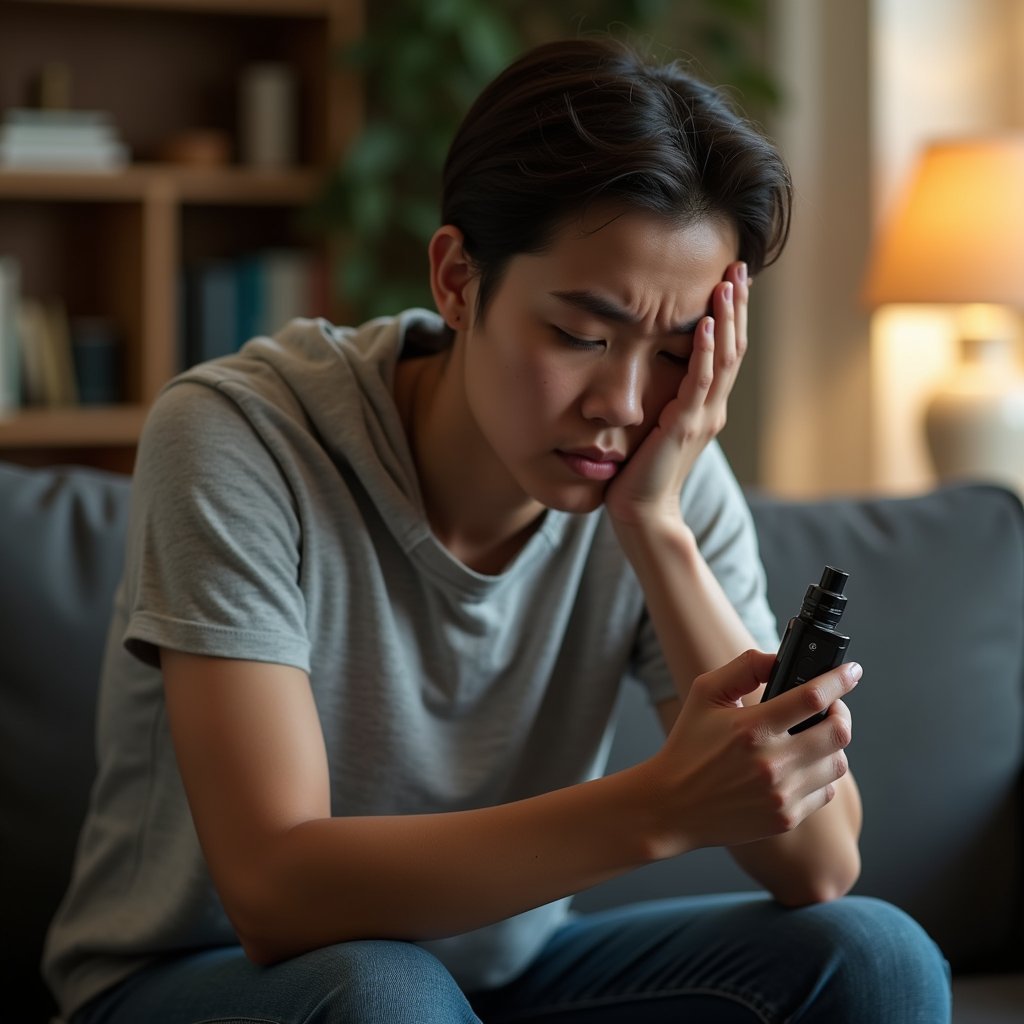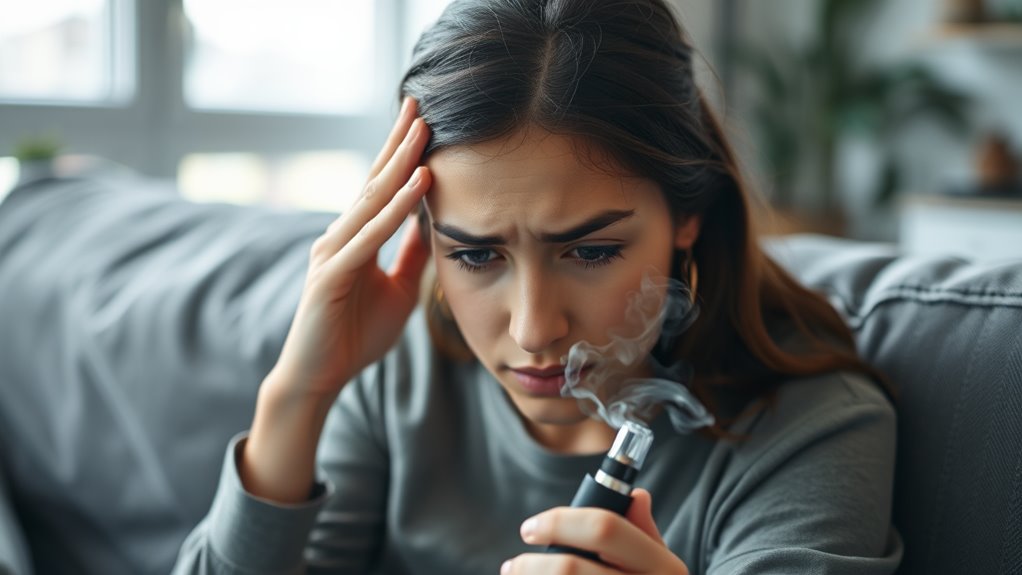While you might believe vaping helps reduce anxiety and stress, scientific research proves otherwise. Studies show that e-cigarette users are 2.5 times more likely to experience anxiety symptoms, and regular vaping increases depression risk by 34%. Though you’ll feel temporary relief, vaping actually disrupts brain chemistry and worsens mental health over time. In fact, 90% of former vapers report decreased anxiety after quitting just one of many evidence-based findings that challenge common misconceptions about vaping’s effects.
The Science Behind Vaping and Mental Health

While vaping is often perceived as a stress-relief tool, scientific evidence reveals concerning links between e-cigarette use and mental health disorders. Research shows that frequent vapers have considerably higher odds of depression diagnoses and anxiety symptoms, with approximately 70% of THC vapers and 60% of nicotine vapers reporting anxiety issues.
The neurochemical effects of nicotine are particularly troubling, as they disrupt brain development and affect regions controlling mood and impulse control. These addiction mechanisms can worsen existing mental health conditions, especially in developing brains. Studies have found strong correlations between vaping and multiple psychiatric disorders, including ADHD, schizophrenia, and bipolar disorder. According to the AHA study data, over half of all vaping groups reported experiencing suicidal thoughts in the past year. College students with prior mental health diagnoses show higher rates of e-cigarette use, suggesting a complex relationship between vaping and psychological well-being. Current e-cigarette users experience twice the odds of receiving a depression diagnosis compared to those who have never used these devices.
Understanding the Link Between Vaping and Anxiety
Although many individuals turn to vaping as a perceived stress-relief method, research consistently demonstrates a troubling bidirectional relationship between e-cigarette use and anxiety. One of the most pervasive vaping myths is that it provides lasting anxiety relief, when studies show it actually worsens mental health symptoms over time. Research presented at the European Respiratory Society has found that young vapers are more than twice as likely to experience chronic stress. Over 2 million students in middle and high schools currently use e-cigarettes.
| Factor | Short-Term Effect | Long-Term Impact |
|---|---|---|
| Nicotine Use | Temporary calm | Increased anxiety |
| Stress Response | Brief relief | Chronic elevation |
| Mental Health | Mood lift | Depression risk |
| Withdrawal | None initially | Severe anxiety |
You’ll find that while vaping might temporarily ease your anxiety symptoms, the neurological effects of nicotine actually disrupt your brain’s natural mood regulation. This creates a cycle where you’re more likely to experience heightened anxiety levels and depend on vaping for relief, despite its counterproductive effects on your mental health.
How Vaping Affects Stress Levels in Young Adults

Despite seeking temporary relief from stress, young adults who turn to vaping face a concerning paradox: 81% report using e-cigarettes to manage anxiety or depression, yet research shows this coping mechanism actually intensifies their mental health challenges.
As a stress coping method among young adults, vaping creates a detrimental cycle that worsens general wellbeing. Studies reveal:
- Higher levels of chronic stress in regular e-cigarette users
- Nicotine withdrawal symptoms that amplify anxiety
- Increased risk of developing depression and anxiety disorders
- Temporary relief that masks underlying stress factors
- Physical health impacts that contribute to supplementary stress
While you might experience momentary relaxation from vaping, evidence demonstrates it’s ineffective for managing chronic stress. Recent data shows that 90% of former vapers experienced reduced anxiety and depression after quitting. The relationship between stress and vaping behavior creates a complex feedback loop, where nicotine dependence ultimately compounds existing mental health challenges. Young adults often misunderstand vaping risks, with only 1 in 4 strongly agreeing that e-cigarettes pose serious health threats.
Common Misconceptions About Vaping as Stress Relief
Since misconceptions about vaping’s stress-relieving properties continue to spread, it is crucial to examine the scientific evidence that contradicts these beliefs. Common vaping myths suggest that e-cigarettes help manage anxiety, but research reveals the opposite effect. While you might experience temporary relief, it’s actually your body responding to nicotine withdrawal rather than genuine stress reduction. Young users report experiencing higher perceived stress when using nicotine products.
These stress misconceptions are largely fueled by tobacco industry marketing, which deliberately positions vaping products as stress-relief solutions. You’ll often see advertisements targeting stressed students and workers, particularly during high-pressure times like the COVID-19 pandemic. The truth is that nicotine can increase your anxiety levels and is linked to higher rates of depression. Studies consistently show that quitting nicotine, rather than continuing use, leads to genuine stress reduction and improved mental health. In fact, ninety percent of e-cigarette users who successfully quit reported experiencing reduced stress and anxiety levels.
Mental Health Risks Associated With Nicotine and THC

When examining the mental health impacts of vaping, research shows that both nicotine and THC can greatly alter brain chemistry and worsen psychological well-being. Studies have revealed that nicotine addiction disrupts mood regulation and impulse control, while THC effects can trigger panic attacks and increase psychosis risk.
Key findings demonstrate severe mental health consequences:
- Dual use of nicotine and THC leads to higher rates of depression and suicidal thoughts
- Regular vaping increases anxiety symptoms, even in short-term users
- High-potency THC vapes considerably raise psychosis risk
- Nicotine withdrawal intensifies anxiety and depression symptoms
- Both substances alter brain structures related to fear and emotional processing
These changes become more pronounced with frequent use, and the combination of both substances creates compounded negative effects on mental health, particularly in developing brains. The trend of starting at younger ages has led to more severe cases of addiction and mental health complications among adolescents. Recent surveys show that 25% of users initially turned to vaping as a method to reduce stress and calm down.
Research Data on Vaping’s Impact on Psychological Well-being
Recent studies show that you’re 2.5 times more likely to experience anxiety symptoms if you’re a regular e-cigarette user compared to non-users. Your risk of developing depression increases by 34% with frequent vaping, while the data indicates particularly concerning impacts on young adults in their late teens to early twenties, where 41% of vapers report worsening mental health symptoms. Research consistently demonstrates that despite initial perceptions of stress relief, you’ll face higher levels of chronic stress and anxiety with continued vaping use, as evidenced by longitudinal studies tracking psychological well-being among vapers. Withdrawal symptoms typically persist for two to four weeks, making anxiety management especially challenging during the cessation period.
Latest Survey Findings
Multiple large-scale surveys have revealed alarming connections between vaping and psychological well-being among young adults. Recent youth perceptions and vaping trends indicate that while many turn to e-cigarettes for stress relief, the data suggests contrary outcomes.
Key findings from contemporary surveys show:
- Young vapers are 2.4x more likely to experience chronic stress
- Self-reported anxiety levels increase with regular vaping use
- Depression symptoms correlate markedly with vaping frequency
- Withdrawal symptoms compound existing mental health challenges
- Cessation leads to improved psychological outcomes
The research contradicts common beliefs about vaping’s stress-relieving properties. The continuous release of dopamine and euphoria from nicotine creates a deceptive sense of temporary well-being. Data from Truth Initiative and similar organizations demonstrates that while users might experience temporary relief, long-term consequences include heightened anxiety and worsened mental health conditions. These findings underscore the importance of correcting misconceptions about vaping‘s psychological impact.
Health Data Analysis
Thorough research data examining vaping’s psychological effects has revealed disturbing patterns in mental health outcomes. Through advanced analysis methods, including logistic regression and chi-square statistics, researchers have found strong correlations between e-cigarette use and increased anxiety, depression, and stress levels among young adults.
Health data from large-scale cross-sectional studies, utilizing tools like DASS-21, shows that you’re more likely to experience severe mental health symptoms if you vape regularly. While you might turn to vaping as a stress reliever, the evidence suggests it’s actually making your anxiety worse. The data consistently demonstrates that both THC and nicotine vaping can exacerbate psychological distress, despite users’ beliefs that they’re self-medicating. However, it is crucial to acknowledge that current research limitations make it difficult to definitively establish causation.
Psychological Impact Statistics
Statistical evidence paints a clear picture of vaping’s psychological toll, with alarming data showing markedly higher rates of mental health issues among users. Research reveals striking disparities in psychological effects between vapers and non-vapers, with vaping habits strongly correlating to increased mental health challenges.
Key findings demonstrate:
- 60% of vapers experience anxiety symptoms versus 40% of non-vapers
- Depression symptoms affect over 50% of vapers compared to 25% of non-vapers
- Suicidal thoughts are reported by more than 50% of vapers versus 33% of non-vapers
- THC-only vapers show the highest anxiety rates at 70%
- 81% of young people initiate vaping as a coping mechanism
These statistics challenge the perception that vaping helps manage stress, instead suggesting it may exacerbate psychological distress rather than alleviate it.
Breaking the Cycle: Mental Health and Vaping Dependency
Breaking free from vaping dependency presents a complex challenge, as the relationship between mental health and nicotine addiction creates a self-reinforcing cycle. Research shows that while you might turn to vaping for temporary stress relief, it actually worsens anxiety and depression over time, especially with dual nicotine and THC use. Ninety percent of users who successfully quit reported reduced stress and anxiety levels. Studies have found that cognitive complaints doubled among e-cigarette users compared to non-users.
| Cycle Phase | Impact on Mental Health | Breaking Free Strategy |
|---|---|---|
| Initial Use | Temporary stress relief | Replace with exercise |
| Dependency | Increased anxiety | Seek professional help |
| Withdrawal | Heightened depression | Join support groups |
| Recovery | Improved mood regulation | Practice stress management |
Understanding this cycle is essential while 81% of young vapers use e-cigarettes to cope with stress, evidence indicates it’s counterproductive. You’ll achieve better mental health outcomes by adopting healthy alternatives like physical activity and professional support rather than relying on vaping as a coping mechanism.
Frequently Asked Questions
How Long Does It Take to See Improved Mental Health After Quitting Vaping?
When you decide to break free from vaping, you’ll begin a quest toward mental clarity. The quitting timeline varies, but you’ll typically notice initial improvements within 24-48 hours, though withdrawal symptoms may temporarily intensify anxiety. Within weeks, you’ll experience improved mood regulation and reduced stress levels. Scientific studies indicate that long-term benefits become more pronounced over months, with significant improvements in general mental well-being and cognitive function.
Can Switching to Nicotine-Free Vapes Help Reduce Anxiety Symptoms Gradually?
Switching to nicotine-free vapes isn’t a scientifically proven method to reduce anxiety symptoms. While you might think it’ll help manage nicotine withdrawal, research hasn’t shown clear benefits. The long-term effects of vaping, even without nicotine, can still pose health risks. You’re better off working with a healthcare provider to develop an evidence-based quitting strategy that may include proven anxiety management techniques like cognitive behavioral therapy and mindfulness practices.
Are There Specific Vaping Products That Cause More Anxiety Than Others?
You’ll find that THC vaping products typically cause more anxiety than nicotine-only options, primarily due to their psychoactive effects and higher product potency. Research shows that varying vaping ingredients can greatly impact anxiety levels, with THC-dominant products leading to more severe symptoms. If you’re using both THC and nicotine products (dual use), you’re at an even higher risk for anxiety due to the combined effects of these substances.
What Age Groups Are Most Vulnerable to Vaping-Induced Anxiety and Stress?
You might be surprised to learn who’s most at risk. Research consistently shows that teens (13-18) and young adults (18-24) face the highest youth vulnerability to vaping-induced anxiety and stress. Studies reveal that anxiety prevalence is particularly pronounced in these age brackets, with younger vapers experiencing more severe symptoms compared to older users. Your risk is especially high if you’re between 15-30 years old, as this demographic often uses vaping as an ineffective coping mechanism.
Does Combining Prescription Anxiety Medication With Vaping Affect Treatment Effectiveness?
While research on specific medication interactions between vaping and anxiety prescriptions is limited, you should know that combining them may compromise your treatment outcomes. Studies suggest that vaping’s nicotine content can intensify anxiety symptoms and potentially interfere with your medication’s effectiveness. You’re putting yourself at risk since vaping could mask symptoms temporarily while undermining long-term treatment success. Healthcare providers typically advise against this combination due to these concerns.
















